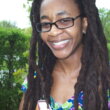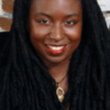Sister Mine
(Libby/OverDrive eBook, Kindle)
Available Platforms
Description
More Details
Also in this Series
Published Reviews
Publisher's Weekly Review
Makeda and Abby are twins who were conjoined at birth but separated, and now as an adult Makeda still feels they are emotionally conjoined. This convoluted story, peopled by a bewildering cast of shape-shifters, traces Makeda's quest for independence and her own mojo, apparently lost during the infant separation. It opens as Makeda looks for her own apartment without telling Abby she is leaving. The seedy place where she hopes to live has "Shine" (a kind of aura), a motley assortment of tenants, and "haint-proof" blue ceilings; however, it proves a poor safe haven as Makeda's shape-shifting haint-her "daemon"-regularly finds and torments her. When Makeda hears that her elderly father has disappeared, she joins Abby and her otherworldly relatives in searching for him and his soul. The story overflows with fantasy: the twins' mother happens to be a lake monster, a kudzu vine named Quashee takes possession of her father's soul, Makeda knits a flying carpet, and Abby dates a young man who used to be a guitar. Although Hopkinson (Brown Girl in the Ring) has a strong narrative voice in Makeda, she's so intent in creating unrelated fantastic situations and events that the book loses momentum and coherence before presenting a simplistic ending. (Mar.) © Copyright PWxyz, LLC. All rights reserved.
Library Journal Review
Life isn't simple for 24-year-old Makeda. A mere mortal, she's trying to establish her independence from her now-separated conjoined magical twin sister, Abby, while dealing with the consequences of her strange parentage: Dad was a demigod, and Mom was a human. When her father's spirit leaves his body and transfers to an angry kudzu vine that's slithering through the streets of Toronto, trouble ensues. In addition to this fantastical backdrop, the World Fantasy Award-winning Hopkinson (Skin Folk) packs in a flying carpet/afghan, a menacing haint, a man who used to be the guitar of Jimi Hendrix, and a host of otherworldly relatives with a plethora of family secrets. Verdict This is a tale with a few interesting, quirky touches, but it's weighted down by one-dimensional characterizations, and long, awkward scenes. Only die-hard Hopkinson fans will want this fantasy. [See Prepub Alert, 9/24/12.]-Sally Harrison, Ocean Cty. Lib., Waretown, NJ (c) Copyright 2013. Library Journals LLC, a wholly owned subsidiary of Media Source, Inc. No redistribution permitted.
Kirkus Book Review
Canadian science fiction/fantasy author Hopkinson (The Chaos, 2012, etc.) goes about five steps too far in this wildly overstuffed tale blending made-up nature mythology with a coming-of-age odyssey. Makeda and Abby are the daughters of a human woman and a demigod who rules all growing things, an illicit union that got Mom turned into a water monster dwelling in Lake Ontario and Dad temporarily exiled into human flesh. Moreover, the girls were born conjoined, and their surgical separation nearly led to Abby's death until Mom persuaded her brother-in-law, guardian of life and death, to give the baby another chance. The rest of Dad's family let that breach pass since Abby has mojo and could almost be a demigod, except she's mortal, while Makeda is a mere "claypicken" with no supernatural powers whatever and hence disdained by her celestial kin. If that sounds murky, it only gets murkier as we learn that the "haint" (ghost) that periodically attacks Makeda is actually her mojo, which got loose at birth and is now trying to rejoin her--but in the meantime Dad loaned her his mojo and won't get it back till she dies. Hopkinson has lost none of her gift for salty, Caribbean-Canadian talk--"those boho Obamanegroes with their braided hemp necklaces" being one of her funnier jabs--and the relationship between Makeda and Abby always rings true: resentment and anger enduringly intertwined with love and loyalty. But a fantasy setup that was overly elaborate to begin with gets increasingly absurd as one bizarre development follows another. It's regrettable, since there are a few gorgeous passages--particularly the one where Makeda rediscovers her mojo while making a magic carpet that doubles as a contemporary art project--that remind us how good this talented author can be when she disciplines her imagination just a tad. Excessive and overwrought, though Hopkinson's fans may love it anyway.]] Copyright Kirkus Reviews, used with permission.
Library Journal Reviews
A World Fantasy Award winner and Nebula Award nominee, Hopkinson intriguingly envisions conjoined twins, one of whom loses her magic when she is separated from her sister. Family members shun the ordinary Makeda until her father shrugs off his human form and vanishes. Now it appears that Makeda may be the only one who can find him.
[Page 56]. (c) Copyright 2012. Library Journals LLC, a wholly owned subsidiary of Media Source, Inc. No redistribution permitted.LJ Express Reviews
Life isn't simple for 24-year-old Makeda. A mere mortal, she's trying to establish her independence from her now-separated conjoined magical twin sister, Abby, while dealing with the consequences of her strange parentage: Dad was a demigod, and Mom was a human. When her father's spirit leaves his body and transfers to an angry kudzu vine that's slithering through the streets of Toronto, trouble ensues. In addition to this fantastical backdrop, the World Fantasy Award–winning Hopkinson (Skin Folk) packs in a flying carpet/afghan, a menacing haint, a man who used to be the guitar of Jimi Hendrix, and a host of otherworldly relatives with a plethora of family secrets. Verdict This is a tale with a few interesting, quirky touches, but it's weighted down by one-dimensional characterizations, and long, awkward scenes. Only die-hard Hopkinson fans will want this fantasy. [See Prepub Alert, 9/24/12.]—Sally Harrison, Ocean Cty. Lib., Waretown, NJ (c) Copyright 2013. Library Journals LLC, a wholly owned subsidiary of Media Source, Inc. No redistribution permitted.
Publishers Weekly Reviews
Makeda and Abby are twins who were conjoined at birth but separated, and now as an adult Makeda still feels they are emotionally conjoined. This convoluted story, peopled by a bewildering cast of shape-shifters, traces Makeda's quest for independence and her own mojo, apparently lost during the infant separation. It opens as Makeda looks for her own apartment without telling Abby she is leaving. The seedy place where she hopes to live has "Shine" (a kind of aura), a motley assortment of tenants, and "haint-proof" blue ceilings; however, it proves a poor safe haven as Makeda's shape-shifting haint—her "daemon"—regularly finds and torments her. When Makeda hears that her elderly father has disappeared, she joins Abby and her otherworldly relatives in searching for him and his soul. The story overflows with fantasy: the twins' mother happens to be a lake monster, a kudzu vine named Quashee takes possession of her father's soul, Makeda knits a flying carpet, and Abby dates a young man who used to be a guitar. Although Hopkinson (Brown Girl in the Ring) has a strong narrative voice in Makeda, she's so intent in creating unrelated fantastic situations and events that the book loses momentum and coherence before presenting a simplistic ending. (Mar.)
[Page ]. Copyright 2013 PWxyz LLCPW Annex Reviews
Makeda and Abby are twins who were conjoined at birth but separated, and now as an adult Makeda still feels they are emotionally conjoined. This convoluted story, peopled by a bewildering cast of shape-shifters, traces Makeda's quest for independence and her own mojo, apparently lost during the infant separation. It opens as Makeda looks for her own apartment without telling Abby she is leaving. The seedy place where she hopes to live has "Shine" (a kind of aura), a motley assortment of tenants, and "haint-proof" blue ceilings; however, it proves a poor safe haven as Makeda's shape-shifting haint—her "daemon"—regularly finds and torments her. When Makeda hears that her elderly father has disappeared, she joins Abby and her otherworldly relatives in searching for him and his soul. The story overflows with fantasy: the twins' mother happens to be a lake monster, a kudzu vine named Quashee takes possession of her father's soul, Makeda knits a flying carpet, and Abby dates a young man who used to be a guitar. Although Hopkinson (Brown Girl in the Ring) has a strong narrative voice in Makeda, she's so intent in creating unrelated fantastic situations and events that the book loses momentum and coherence before presenting a simplistic ending. (Mar.)
[Page ]. Copyright 2013 PWxyz LLCReviews from GoodReads
Citations
Hopkinson Nalo. (2013). Sister Mine . Grand Central Publishing.
Chicago / Turabian - Author Date Citation, 17th Edition (style guide)Hopkinson Nalo. 2013. Sister Mine. Grand Central Publishing.
Chicago / Turabian - Humanities (Notes and Bibliography) Citation, 17th Edition (style guide)Hopkinson Nalo. Sister Mine Grand Central Publishing, 2013.
Harvard Citation (style guide)Hopkinson Nalo. (2013). Sister mine. Grand Central Publishing.
MLA Citation, 9th Edition (style guide)Hopkinson Nalo. Sister Mine Grand Central Publishing, 2013.
Copy Details
| Collection | Owned | Available | Number of Holds |
|---|---|---|---|
| Libby | 1 | 0 | 0 |































